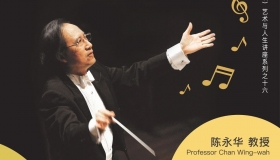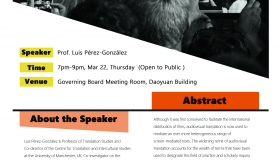From Princess to Wife: Two Interpretations of the Story of Marriage in the ‘Canon of Yao,’ The Classic of Documents
In traditional Chinese political culture, the ideas in Confucian classics were interpreted and deemed as eternal truths and unchangeable principles. Nevertheless, emperors and Confucians in different dynasties continued to invest Confucian classics with new meanings in order to redefine and reshape the order of society and politics. In this talk, Professor Ho Wei-Hsuan will introduce Confucian classic The Classic of Documents and investigate how the interpretations and annotations of this classic were involved in the shaping of political ideology and social norms. Particularly, Professor Ho will analyze how the various interpretations of the marriage between Emperor Yao’s daughters and Shun in the “Canon of Yao,” a chapter in The Classic of Documents, reflect the change in the ritual of the princess’ wedding ceremony from the Tang Dynasty (618-907) to the Song Dynasty (960-1279). He will also examine how the diverse exegeses and the ritual change demonstrate the emperor’s ambition to regulate social relations and solidify the political hierarchy. In this talk on the story of marriage in The Classic of Documents as well as the princess’ wedding ceremony, Professor Ho focuses on how the reinterpretation of a Confucian classic interacts with the political agenda, social norms and gender relations, and he aims to guide the audience to grasp the relation between “real life” and the traditional Chinese canon.
Topic: “From Princess to Wife: Two Interpretations of the Story of Marriage in the ‘Canon of Yao,’ The Classic of Documents”
Time & Date: 16:30-18:00, December 19, Wednesday.
Venue: Zhixin 110.
Speaker: Professor Ho Wei-Hsuan. Department of Chinese Linguistics and Literature, Yuan Ze University, Taiwan.
Moderator: Dr. Kuan-yen Liu. The School of Humanities and Social Science, CUHK-Shenzhen.
Language: Chinese
Speaker Biography:
At Yuan Ze University in Taiwan, Professor Ho Wei-Hsuan is currently Associate Professor in the Department of Chinese Linguistics and Literature, and he is also serving on the Committee of the “International Program in Humanities and Social Sciences for Bachelor.” Before joining Yuan Ze University, Professor Ho served as a full-time Teaching Fellow in the Department of Chinese Culture at Hong Kong Polytechnic University. Professor Ho earned his Ph.D. from the Department of Chinese Culture at Hong Kong Polytechnic University. Prior to his doctoral study, he obtained his B.A. and M.A from the Department of Chinese Literature at National Taiwan University.
Professor Ho specializes in Song-Ming (960-1279; 1368-1644) Confucianism as well as late imperial Chinese thought, and he teaches not only courses on Chinese philosophy and thought but also a variety of courses on classical Chinese literature and literary thought, like courses on “Traditional Chinese Drama” and “Dragon-Carving and the Literary Mind.” In addition, Professor Ho is an award-winning amateur actor of the Peking Opera, an award-winning creator of classical Chinese prose and lyrics, and a player of the traditional Chinese instrument Jinghu.
Professor Ho has published thirteen academic papers on Chinese philosophy and thought in first-rate academic journals, like Ming Studies Journal (The Chinese Society of Ming Dynasty History), Journal of Chinese Studies (The Chinese University of Hong Kong), Chinese Culture Quarterly (City University of Hong Kong), Bulletin of the Department of Chinese Literature of National Taiwan University, History Inquiry (National Taiwan University), Humanitas Taiwanica(National Taiwan University), Tsing Hua Journal of Chinese Studies, Journal of Chinese Literature of NCKU, etc. The scope of these publications ranges from Pre-Qin (Pre-221 B.C.) classics like The Classic of Documents and Mozi to Song-Ming (960-1279; 1368-1644) Confucianism and Qing (1644-1911) thought. In addition, Professor Ho has received funding for his four research projects from the Ministry of Science and Technology, Taiwan.
Professor Ho is devoted not only to academic research but also to the general education of Chinese classics. He has organized English-taught courses on Chinese culture and published an introductory book concerning Outlaws of the Marsh, a masterpiece of classical Chinese fiction. In this talk at the Chinese University of Hong Kong, Shenzhen, on the basis of solid academic knowledge, Professor Ho will discuss the socio-political significance of the story of marriage in The Classic of Documents with an eye to generating among students an interest in Chinese classics.





